9+ Death Investigation Report Examples to Download
The key to improving digital marketing performance is by measuring it using a proper data tracking mechanism in place. As such, a Digital Marketing Report (DMR) is created to provide a detailed look at performance across digital channels. A DMR offers insight into major digital marketing trends across devices, from search engines to digital platforms. Using this, you can measure how your goals and objectives are met, identify the gaps and determine ways to address them, and, identify actionable steps to improving marketing performance.
Submitting DMRs does a lot of help in retaining clients. The progress reflected in the digital marketing report dashboard shows that efforts are paying off. DMRs articulate how campaigns fulfill goals, generate sales, and bring in revenue.
Need some inspiration on your next digital marketing report? Browse our examples today!
9+ Digital Marketing Report Examples
1. Sample Digital Marketing Report Example
2. Digital Marketing Survey Report Example
3. Online Digital Marketing Opportunity Report Example
4. Basic Digital Marketing Report Example
5. Digital Business Marketing Report Example
6. Digital Marketing Benchmarking Report Example
7. Digital Marketing Program Report Example
8. Digital Marketing insights Report Example
9. Digital Marketing Session Report Example
10. Sample Digital Marketing Web Report Example
What Is a Digital Marketing Report?
In its broad sense, a digital marketing report is a set of data created to measure how the performance of a specific marketing campaign or effort was able to fulfill certain goals and objectives. Since it’s a good tool for predicting outcomes, it is utilized to effectively communicate a company’s marketing strategy, from market research to promotional tactics, among others.
Given that progress is measured periodically, a DMR is created/updated often through a weekly report, monthly report, and quarterly report. You may also have your DMR on a daily perusal, but as a general rule of thumb, regular marketing reports should be created on a monthly basis. In data-speak, a month is long enough to gather sufficient relevant data, but not too long to miss opportunities and leave low-performing strategies unaddressed.
The Fundamentals of a Digital Marketing Report
The value of every DMR is measured on how the document is presented (information and structure) in a way that is digestible and useful. Before looking into data collection and analysis regarding your marketing campaign, it’s imperative that you create a template that will serve as the structure you will base your work on afterward. By now, it’s crucial you consider the following tips:
1. Identify Objectives
Every digital marketing campaign has a purpose and a series of measurable goals (lead generation, traffic, sales, and so on). The goals will determine the success or failure of a campaign. As such, these should be the driving force in your DMR. Analyze and compare each piece of data with your stated objectives.
2. Focus on the Critical Information
As they say, “Less is more.” So, keep in mind that the goal of the report is to give the readers an idea of how the campaign implemented fared. For this, assume that the reader is always busy. Only include essential details. If you choose to add secondary information, place them in the appendices.
3. Use Graphic Representations
Make your report more efficient and easily digestible by presenting data using graphical representations, such as bar charts, tables, line graphs, etc. Luckily, PDF, Microsoft Word, Excel, and other software tools actually have features that allow you to create figures for your data presentation.
What Should My DMR Contain?
“How did the campaign go?” This is a question everyone reading the report has in mind. To answer this question, it is crucial to provide an organized structure of data and overall results in a manner that the client is able to tell if the campaign has worked out or not, right in the first few pages.
So, what are these results that we need in our reports?
1. Collective Campaign Results
This should come first as this is the most crucial part of the report. Here, it should provide a summary of the campaign’s goals and the results yielded.
2. Results by Channel
After the overall campaigns result, provide how multichannel (social media, paid media, websites, and more) actions contributed to achieving the goals set at the beginning of the campaign. However, feel free to include this information at the beginning of the report should you find this interesting. You can use a tabular presentation with a breakdown by channel and the corresponding data — this should suffice.
3. Supporting Data
At this part of the report, you need to expound on the actions carried out. These will generally include the SEO campaigns and paid media traffic, among others that you have taken. Then, followed with the conclusion and recommendations. To which end, list out the succeeding steps the team will need to undertake.
FAQs
How Does Digital Marketing Benefit My Business?
Venturing into digital marketing allows your business to get access to the media where a majority of consumers turn to most of the time in a day. This is where you can increase your potential in generating leads and bring in revenues.
Can Facebook Help Me Grow My Business?
Definitely! Considering that Facebook is the social media platform of choice by over billions of people worldwide, you can use it to connect with your audience, and, share useful and encouraging content to your fans.
What Are the Ideal Characteristics of a Report?
A good report should be simple, clear, restrained, positive, readable, and accurate.
Like how others look at it, creating a DMR can be daunting and a bit scary. But fret not because examples.com is here to provide you a number of marketing report templates and examples to give you ideas and streamline your work. The next time you create a DMR and need inspiration, our website is just a search away.
9+ Death Investigation Report Examples to Download
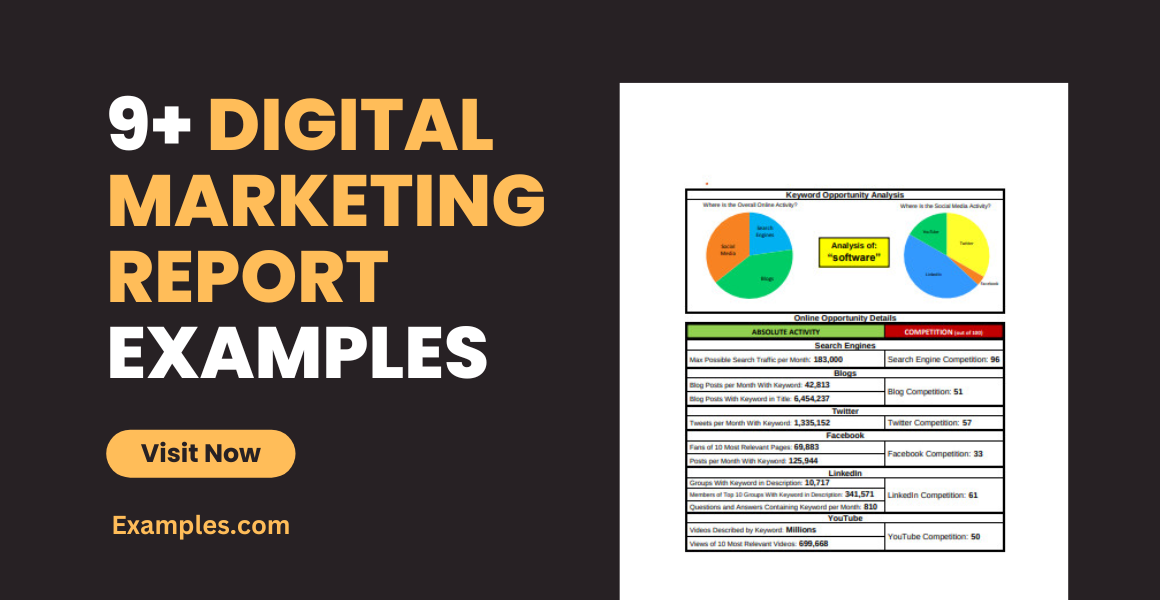
The key to improving digital marketing performance is by measuring it using a proper data tracking mechanism in place. As such, a Digital Marketing Report (DMR) is created to provide a detailed look at performance across digital channels. A DMR offers insight into major digital marketing trends across devices, from search engines to digital platforms. Using this, you can measure how your goals and objectives are met, identify the gaps and determine ways to address them, and, identify actionable steps to improving marketing performance.
Submitting DMRs does a lot of help in retaining clients. The progress reflected in the digital marketing report dashboard shows that efforts are paying off. DMRs articulate how campaigns fulfill goals, generate sales, and bring in revenue.
Need some inspiration on your next digital marketing report? Browse our examples today!
9+ Digital Marketing Report Examples
1. Sample Digital Marketing Report Example
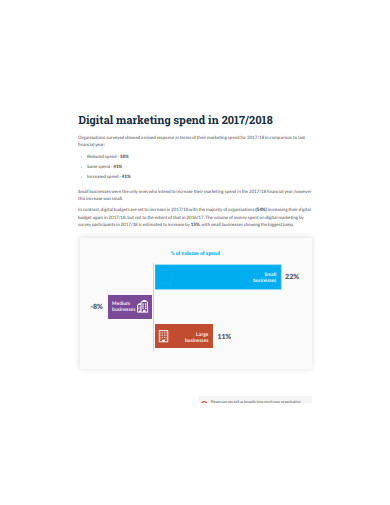
bangdigital.com.au
Details
File Format
PDF
Size: 2 MB
2. Digital Marketing Survey Report Example
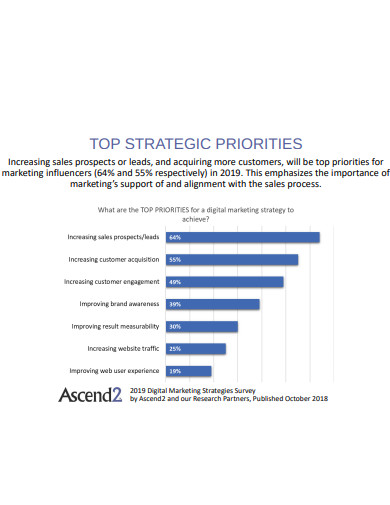
ascend2.com
Details
File Format
PDF
Size: 921 KB
3. Online Digital Marketing Opportunity Report Example
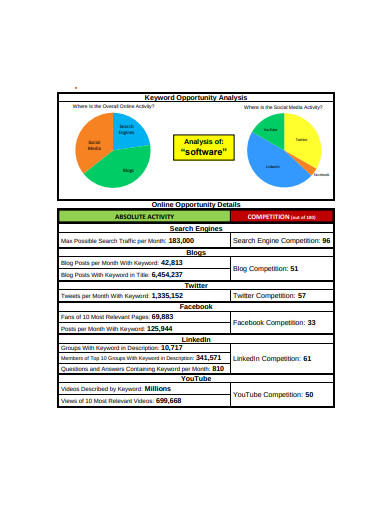
hubspot.com
Details
File Format
PDF
Size: 1 MB
4. Basic Digital Marketing Report Example
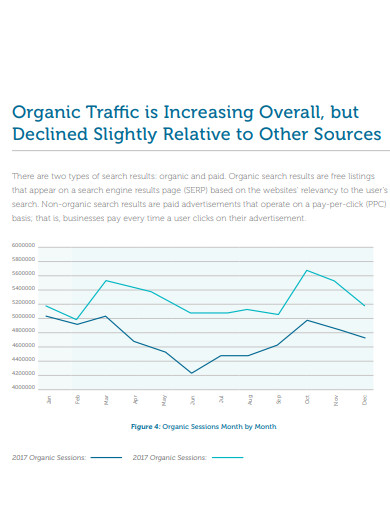
pureseo.co.nz
Details
File Format
PDF
Size: 4 MB
5. Digital Business Marketing Report Example
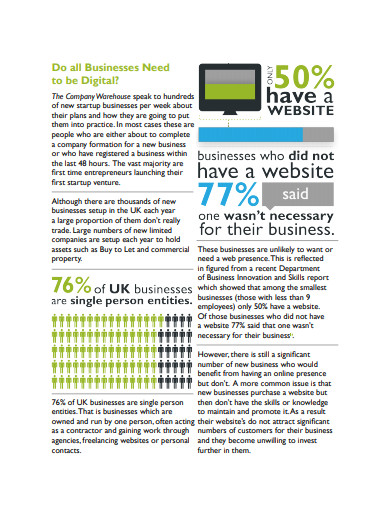
thecompanywarehouse.co.uk
Details
File Format
PDF
Size: 2 MB
6. Digital Marketing Benchmarking Report Example
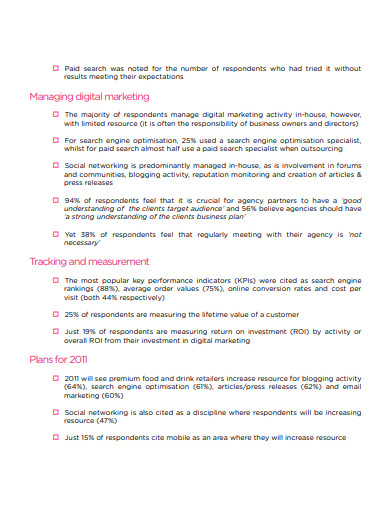
leapfrogg.co.uk
Details
File Format
PDF
Size: 619 KB
7. Digital Marketing Program Report Example
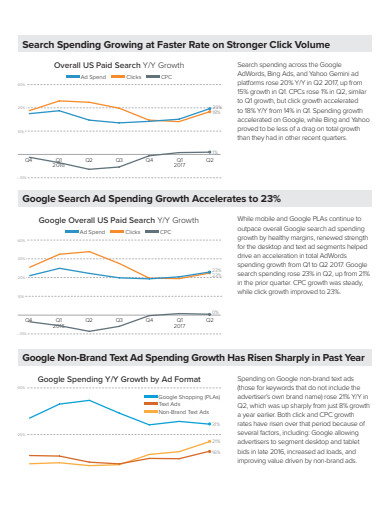
pacificadsolutions.com
Details
File Format
PDF
Size: 281 KB
8. Digital Marketing insights Report Example
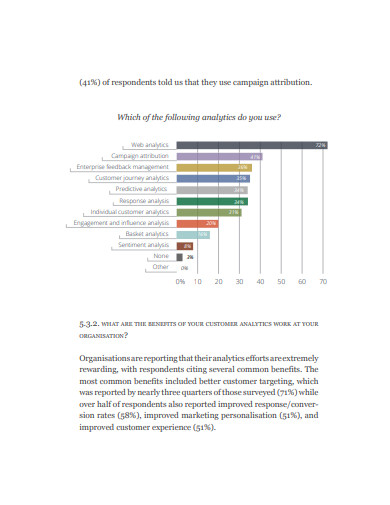
assets.teradata.com
Details
File Format
PDF
Size: 2 MB
9. Digital Marketing Session Report Example
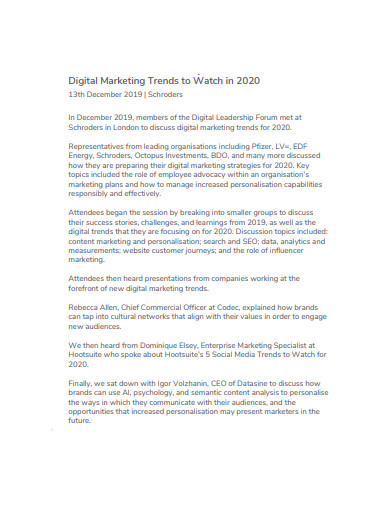
digitalleadershipforum.co.uk
Details
File Format
PDF
Size: 2
10. Sample Digital Marketing Web Report Example
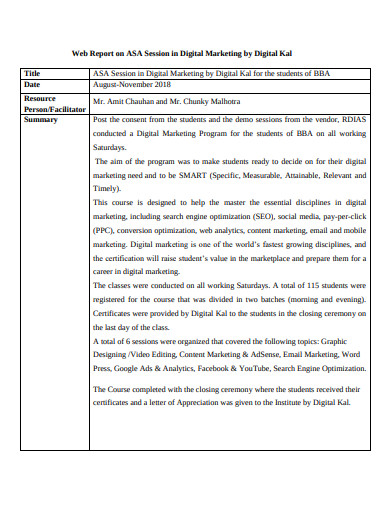
rdias.ac.in
Details
File Format
PDF
Size: 139
What Is a Digital Marketing Report?
In its broad sense, a digital marketing report is a set of data created to measure how the performance of a specific marketing campaign or effort was able to fulfill certain goals and objectives. Since it’s a good tool for predicting outcomes, it is utilized to effectively communicate a company’s marketing strategy, from market research to promotional tactics, among others.
Given that progress is measured periodically, a DMR is created/updated often through a weekly report, monthly report, and quarterly report. You may also have your DMR on a daily perusal, but as a general rule of thumb, regular marketing reports should be created on a monthly basis. In data-speak, a month is long enough to gather sufficient relevant data, but not too long to miss opportunities and leave low-performing strategies unaddressed.
The Fundamentals of a Digital Marketing Report
The value of every DMR is measured on how the document is presented (information and structure) in a way that is digestible and useful. Before looking into data collection and analysis regarding your marketing campaign, it’s imperative that you create a template that will serve as the structure you will base your work on afterward. By now, it’s crucial you consider the following tips:
1. Identify Objectives
Every digital marketing campaign has a purpose and a series of measurable goals (lead generation, traffic, sales, and so on). The goals will determine the success or failure of a campaign. As such, these should be the driving force in your DMR. Analyze and compare each piece of data with your stated objectives.
2. Focus on the Critical Information
As they say, “Less is more.” So, keep in mind that the goal of the report is to give the readers an idea of how the campaign implemented fared. For this, assume that the reader is always busy. Only include essential details. If you choose to add secondary information, place them in the appendices.
3. Use Graphic Representations
Make your report more efficient and easily digestible by presenting data using graphical representations, such as bar charts, tables, line graphs, etc. Luckily, PDF, Microsoft Word, Excel, and other software tools actually have features that allow you to create figures for your data presentation.
What Should My DMR Contain?
“How did the campaign go?” This is a question everyone reading the report has in mind. To answer this question, it is crucial to provide an organized structure of data and overall results in a manner that the client is able to tell if the campaign has worked out or not, right in the first few pages.
So, what are these results that we need in our reports?
1. Collective Campaign Results
This should come first as this is the most crucial part of the report. Here, it should provide a summary of the campaign’s goals and the results yielded.
2. Results by Channel
After the overall campaigns result, provide how multichannel (social media, paid media, websites, and more) actions contributed to achieving the goals set at the beginning of the campaign. However, feel free to include this information at the beginning of the report should you find this interesting. You can use a tabular presentation with a breakdown by channel and the corresponding data — this should suffice.
3. Supporting Data
At this part of the report, you need to expound on the actions carried out. These will generally include the SEO campaigns and paid media traffic, among others that you have taken. Then, followed with the conclusion and recommendations. To which end, list out the succeeding steps the team will need to undertake.
FAQs
How Does Digital Marketing Benefit My Business?
Venturing into digital marketing allows your business to get access to the media where a majority of consumers turn to most of the time in a day. This is where you can increase your potential in generating leads and bring in revenues.
Can Facebook Help Me Grow My Business?
Definitely! Considering that Facebook is the social media platform of choice by over billions of people worldwide, you can use it to connect with your audience, and, share useful and encouraging content to your fans.
What Are the Ideal Characteristics of a Report?
A good report should be simple, clear, restrained, positive, readable, and accurate.
Like how others look at it, creating a DMR can be daunting and a bit scary. But fret not because examples.com is here to provide you a number of marketing report templates and examples to give you ideas and streamline your work. The next time you create a DMR and need inspiration, our website is just a search away.

